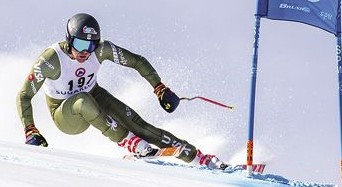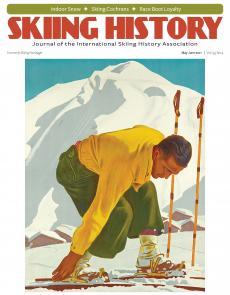SKIING HISTORY
Editor Greg Ditrinco
Consulting Editor Seth Masia
Art Director Edna Baker
Editorial Board
Seth Masia, Chairman
John Allen, Andy Bigford, John Caldwell, Jeremy Davis, Kirby Gilbert, Paul Hooge, Jeff Leich, Bob Soden, Ingrid Wicken
Founding Editors
Morten Lund, Glenn Parkinson
To preserve skiing history and to increase awareness of the sport’s heritage
ISHA Founder
Mason Beekley, 1927–2001
ISHA Board of Directors
Rick Moulton, Chairman
Seth Masia, President
Wini Jones, Vice President
Jeff Blumenfeld, Vice President
John McMurtry, Vice President
Bob Soden (Canad), Treasurer
Einar Sunde, Secretary
Richard Allen, Skip Beitzel, Michael Calderone, Art Currier, Dick Cutler, David Ingemie, Joe Jay Jalbert, Henri Rivers, Charles Sanders, Christof Thöny (Austria), Ivan Wagner (Switzerland)
Presidential Circle
Christin Cooper, Billy Kidd, Jean-Claude Killy, Bode Miller, Doug Pfeiffer, Penny Pitou, Nancy Greene Raine
Membership Services
Laurie Glover
(802) 375-1105
laurie@skiinghistory.org
Corporate Sponsorships
Peter Kirkpatrick
(541) 944-3095
peterk10950@gmail.com
Bimonthly journal and official publication of the International Skiing History Association (ISHA)
Partners: U.S. Ski and Snowboard Hall of Fame | Canadian Ski Museum and Hall of Fame
Alf Engen Ski Museum | North American Snowsports Journalists Association | Swiss Academic Ski Club
Skiing History (USPS No. 16-201, ISSN: 23293659) is published bimonthly by the International Skiing History Association, P.O. Box 1064, Manchester Center, VT 05255.
Periodicals postage paid at Manchester Center, VT and at additional mailing offices. Postmaster: Send address changes to ISHA, P.O. Box 1064, Manchester Center, VT 05255
ISHA is a 501(c)(3) public charity. EIN: 06-1347398
Written permission from the editor is required to reproduce, in any manner, the contents of Skiing History, either in full or in part.
All in the Family: The Skiing Cochrans
The Skiing Cochrans turned their passion into a Vermont institution. And they aren’t slowing down.
When Ryan Cochran-Siegle won the World Cup super-G in Bormio, Italy, last December, he ended a 14-year drought for American male skiers in that event. He also became the first Vermont-born skier to win a World Cup since 1973. That race was won by his aunt, Marilyn Cochran Brown. At home, nervously watching, was his mother, 1972 slalom gold medalist Barbara Ann Cochran—along with the entire Cochran clan which, including Ryan, boasts 10 World Cup skiers and six Olympians across two generations.
(Photo top of page: Ryan Cochran-Siegle on course at the 2019 US National Alpine Championships. Courtesy USSA/Jamie
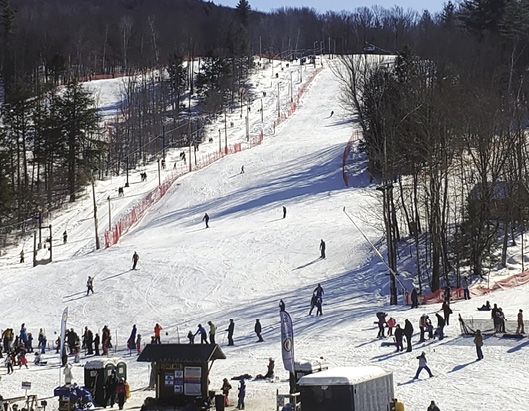
Courtesy Cochran's.
Walter)
The Cochrans aren’t just Vermont skiers—they are Vermont skiing. To understand what that means, one need only take in the scene at Cochran’s Ski Area in Richmond, Vermont. On any winter day, the little hillside just off I-89, between Montpelier and Burlington, is buzzing. Race teams from youth through collegiate, plus school learn-to-ski programs and families, converge to lap the rope tow and T-bar and learn to ski “The Cochran Way.”
A Legacy Is Born
Cochran’s mission starts with a simple statement: No child will be denied the opportunity to ski or ride. This was the ethos from the start, in 1961, when Mickey Cochran installed a 400-foot rope tow behind his house. He not only wanted his kids to be able to ski after school, but also wanted, with his wife, Ginny, to invite the community. In so doing they created something more than a ski area. They created a Vermont institution that now provides year-round affordable recreation in a 100 percent home-grown environment that embraces Mickey Cochran’s philosophy of working hard and, above all, having fun.
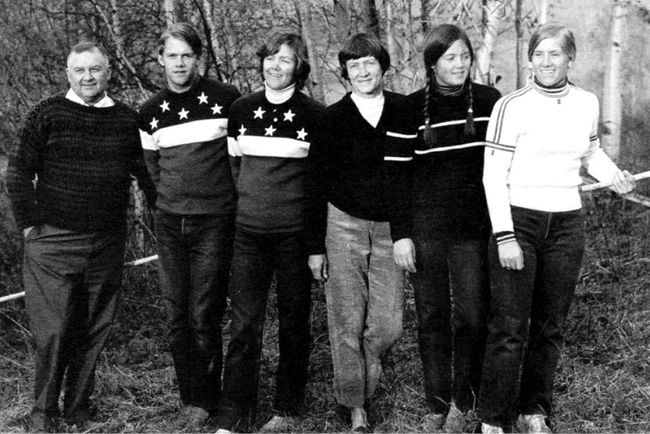
Lindy and Barbara Ann. Peter Miller photo.
The original Skiing Cochrans are, in order of birth, Marilyn, Barbara Ann, Bob and Lindy. Mickey coached them on the tow during the week, then at Smugglers’ Notch on weekends. “We had modest means, and did with what we had,” says Lindy.
The alchemy of Mickey’s engineering mind and teaching skills, along with his Depression-era work ethic and love for the sport, cultivated a kind of magic in the community, and world class talent in his kids. All four became World-Cup and Olympic skiers. Marilyn had three World Cup victories and was World Cup GS champion in 1969; Barbara Ann won three World Cups and Olympic slalom gold in 1972; brother Bob earned one World Cup win and podiums in all three disciplines; and Lindy scored a World Cup podium and was the top US finisher in slalom and GS at the 1976 Olympics.
All four went on to graduate from the University of Vermont, like their parents. Barbara Ann and Marilyn coached the UVM ski
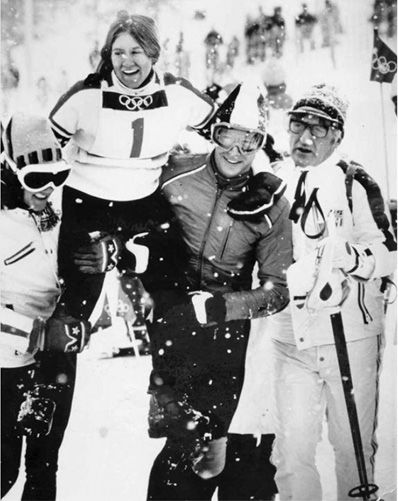
at the 1972 Sapporo Games.
Courtesy New England Ski
Museum.
team, as had Mickey. Bob and Lindy raced—Bob while on the US Ski Team and Lindy on a full athletic scholarship (one of UVM’s first to a woman). As the kids built their own families and careers, Mickey kept the tow running, adding a T-bar and a lodge, while Ginny continued running the learn-to-ski program she had started when Cochran’s first opened. When Mickey passed away in 1998, Cochran’s gained 501(c)(3) status to open up fundraising opportunities.
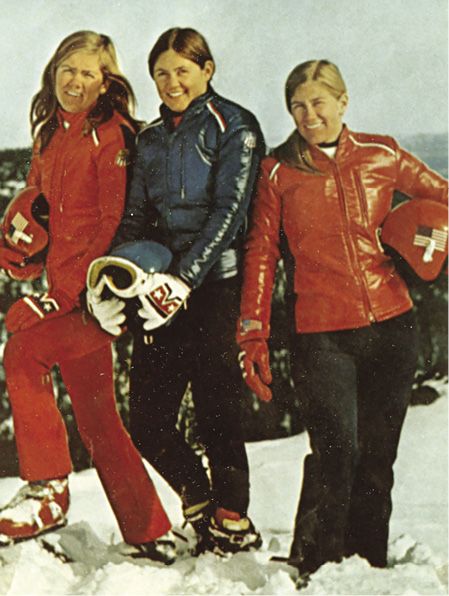
in 1972 US Ski Team uniforms.
New England Ski Museum.
As the first generation of the Skiing Cochrans took over the area, the next generation made their mark on US skiing. In 2002 Lindy and Steve Kelley’s oldest child, Jessica, made the US Ski Team. Bob’s son Jimmy was next, followed by Marilyn’s son Roger Brown, then Tim Kelley. Jimmy, his younger sister Amy, plus Tim and Robby Kelley also raced for UVM, while Roger raced for Dartmouth and brother Doug for St. Lawrence University. In 2011, both Robby and Barbara Ann’s son Ryan made the US Ski Team, where they would compete together on two World Championship teams and enjoy the privilege of being teammates, competitors, best friends and family.
Robby would blaze a new trail in US skiing. When he and brother Tim were dropped from the team in 2014, they, with two fellow Vermonters, created a Vermont-based self-funded, self-coached independent team, Redneck Racing. With camo and red flannel/denim-themed racing suits, epic frugality and ample humor, the Rednecks built an enthusiastic fan base and broad community support. The following year, Tim and Robby regained USST nominations, but Robby declined, folding into
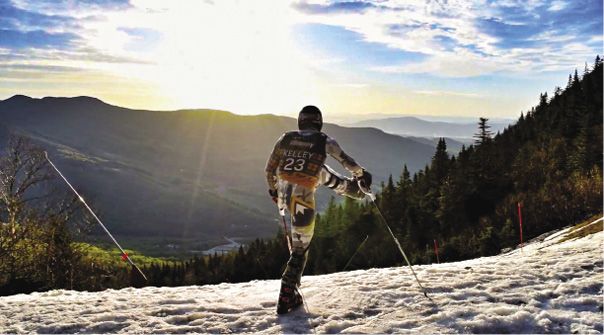
another day of training. Cochran's.
the US Ski Team at World Cups but otherwise going it on his own. “I enjoyed being liberated and free to do things how I thought they should be done,” he says.
Robby enrolled in Castleton University, adding college football to his resume while finishing up his studio art degree. Last season he raced as much as he could domestically. “Racing is great, but when you take it too seriously it can be bad for you. The whole thing with Cochran’s is, we always try to make it fun.”
He recently built a house in nearby Duxbury with help from his dad and YouTube, and he’s over at Cochran’s almost every day it’s open. Compared to the “one course, no snowmaking, no grooming, no lights” after-school training experience he grew up with, the area now is “turning into the real deal.” In addition to snowmaking in 2006 and lights in 2010, the area added a new beginner trail last season. Five years ago, Jimmy took charge of managing the area with, as Robby describes it, “more skills than any person I’ve ever met.”
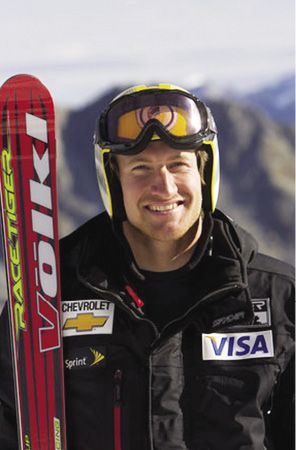
Olympian and winner of four
US titles.
Carrying the Name Forward
Jimmy Cochran represented the United States in two Olympics (2006, 2010) before finishing his mechanical engineering degree while coaching at UVM. As general manager at Cochran’s he is immersed in every aspect of keeping the resort running. With help from his employees, the community, and Mickey’s detailed notes on every piece of equipment, that may mean staying up all night making snow or solving any number of unexpected problems that come up. “It’s such a great job,” he says. “It’s a ton of hours. But it’s so fun.”
Jimmy was 16 years old when Mickey passed away, and while he missed fully experiencing his coaching genius, he remembers the joy on his grandfather’s face while watching kids ski at Cochran’s. That motivates his primary mission to get kids recreating. “You need to make it work so the kids can come skiing.”
Donations of money as well as equipment, time and expertise have helped keep Cochran’s afloat and growing. Jimmy credits support from the community as well as from bigger ski areas. He ticks off resorts like Sugarbush, Killington, Smugglers’ Notch and Berkshire East, as well as snowmaking giant HKD for generously contributing to Cochran’s success.
Last summer, in conjunction with Richmond Mountain Trails, Cochran’s added a pump track and beginner loop to its existing mountain biking trail network. The biking gets rave reviews
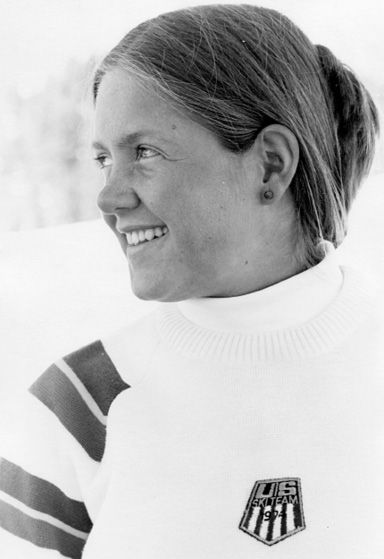
slalom and GS at the 1976
Innsbruck Games.
New England Ski Museum.
and, in keeping with the Cochran’s ethos, is a free community resource. Nonetheless, “We’ve benefitted as an organization from biking,” says Jimmy. Cochran’s also boasts its own community-accessible outdoor dryland training facility, the lush “Field of Excellence” (Robby’s playful alternative to the US Ski Team’s $24 million Center of Excellence). It’s sprinkled with barbells, tires to jump through and plenty of natural obstacles.
Branching Out: Slopeside and Untapped
Cochran’s sits on Mickey and Ginny’s original land plus two adjoining parcels acquired over the years. When doing a current-use study in 2009, a forester noted the potential for 22,000 maple taps on their nearly 600 acres. In 2010, Jimmy, Tim, Roger and Doug built a sugarhouse, and in 2011 Slopeside Syrup was born. Today, the sugaring operation is run by Tim and Jimmy while Marilyn’s sons, Doug and Roger, run UnTapped, selling maple products aimed at elite athletes.
Meanwhile, Barbara Ann teaches the Ski Tots program on weekends and Lindy coaches the U-16/U-19 program, though both have scaled back to part time. The extra time has allowed Barbara Ann to do more sports psychology work with athletes, combining her own training on mindset and process, with lessons from Mickey who advised his kids to “concentrate on the skill and let the results take care of themselves.”
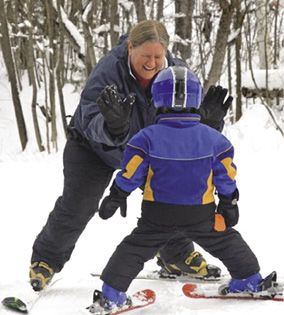
on weekends. Cochran's.
The next two generations live locally for the most part. Only Jess and Bob’s daughter Amy, a professor at the University of Wisconsin, lives outside of Vermont. Ryan’s sister Caitlin and her two kids live in Jeffersonville. Jimmy, his brother Tom and Roger—with eight kids among them—all live on the land behind Cochran’s. Roger is a fixture at the ski area and Jimmy often makes his rounds with his infant son strapped to his chest.
Amidst Covid, Cochran’s manages to thrive. Last season, the lodge was closed, as were equipment rentals, but the snack bar served food through the former rental shop window and Jimmy kept the firepits lit for guests to stay warm between runs. A new beginner’s trail winds from the top of the newly extended T-bar. The $265 family pass is a popular bargain. Hundreds of kids from surrounding towns learn to ski in after-school programs, while Cochran’s Ski Club and seven high school teams train day and night. High on Jimmy’s wish list is an FIS homologated GS course, which is possible but would require significant work and expense. “It would be a huge undertaking,” says Jimmy. “To max our potential as a nonprofit area we need to get there.”
This One’s on Ryan
As the first Cochran of this generation to win a World Cup, Ryan assumes a new responsibility. As Lindy explains, the family joke
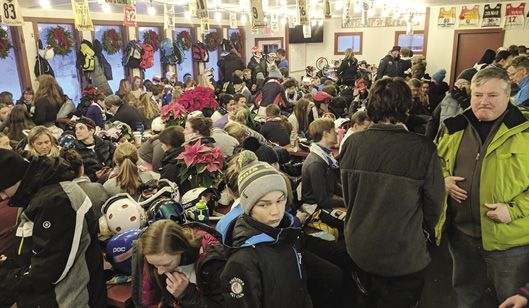
passion, little elbow room.
Cochran's.
from the older generation was always, “You can buy us dinner when you win your first World Cup.” Unlike the older generation, which logged formative miles on bigger mountains, Jimmy points out that his cousin Ryan “truly is a product of Cochran’s. When he was little he just skied Cochran’s.” Ryan took full advantage of Cochran’s as a viable training venue and is the first of his generation to excel in speed events.
As Bob explains, ski racing is the second hardest sport in the world. Being a ski racing parent is the hardest. When Barbara Ann follows her son through livestreams and live-timing, she enlists her best mental imagery to handle the stress. “I call on the angels and ask them to keep him safe and healthy. What else can I do?”
The angels were with him in January when Ryan, who had won the final training run of the treacherous Hahnenkamm, crashed into the fences on race day. Ryan says he was “lucky to walk away with nothing more than a minor broken neck,” a description that would not bring much comfort to most moms. He had to sit out the 2021 World Championships, where he would have been a favorite in Downhill, super-G, and a contender in GS.
What Ryan will get when he returns to Cochran’s is a hero’s welcome. And the dinner check. 
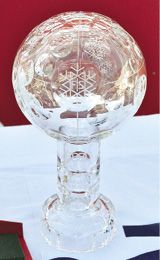 Global Intrigue
Global Intrigue
When Marilyn Cochran won the GS title in 1969, neither she nor the US Ski Team nor K2—for which she scored the first World Cup win—made a big deal out of it. “I’d gotten second so many times that year that I didn’t think I’d done that well,” she recalls. She, Bob Beattie and Kiki Cutter (2nd in the slalom standings that season) went to Evian, France, to get the award, which, for her, was not a crystal globe. But she now does have one of Karl Schranz’s globes, thanks to a man she met through her property management business.
Schranz, who had won the overall and DH titles in 1969 and 1970, and the GS title in 1969, came to the States in summer 1971 for a PR tour with three of his globes. Rather than take the globes through customs on the return, he opted to leave them with his ski company representative.
The son of that man worked for a cleaning company Cochran met through her property business. They had contacted Schranz multiple times over the years about the globes, but Schranz never retrieved them.
Eventually the cleaning company guy offered one to her. It was for the wrong year, and the
bottom is broken but, as Cochran says, “I do have a globe—sort of.” Today, her official award lives at the Vermont Ski and Snowboard Museum in Stowe, while the globe lives in a Slopeside Syrup box beneath her desk at UnTapped. —ETM

Table of Contents

Corporate Sponsors
ISHA deeply appreciates your generous support!
WORLD CHAMPIONSHIP ($3,000 AND UP)
Gorsuch
Polartec
CHAMPIONSHIP ($2,000)
Fairbank Group: Bromley, Cranmore, Jiminy Peak
Hickory & Tweed Ski Shop
WORLD CUP ($1,000)
Aspen Skiing Company
Bogner
Boyne Resorts
Dale of Norway
Darn Tough Vermont
Dynastar | Lange | Look
Gordini USA Inc. | Kombi LTD
HEAD Wintersports
Intuition Sports, Inc.
Mammoth Mountain
Marker-Volkl USA
National Ski Areas Association
Outdoor Retailer
Rossignol
Ski Area Management
Ski Country Sports
Snowsports Merchandising Corporation
Sport Obermeyer
Sports Specialists, Ltd.
Sun Valley Resort
Vintage Ski World
Warren and Laurie Miller
Yellowstone Club
GOLD ($700)
Larson's Ski & Sport
Race Place | BEAST Tuning Tools
The Ski Company (Rochester, NY)
Thule
SILVER ($500)
Alta Ski Area
Boden Architecture PLLC
Dalbello Sports
Deer Valley
Ecosign Mountain Resort Planners
Fera International
Holiday Valley
Hotronic USA, Inc. | Wintersteiger
MasterFit Enterprises
McWhorter Driscoll, LLC
Metropolitan New York Ski Council
Mt. Bachelor
New Jersey Ski & Snowboard Council
Russell Mace Vacation Homes
Schoeller Textile USA
Scott Sports
Seirus Innovations
SeniorsSkiing.com
Ski Utah
Steamboar Ski & Resort Corporation
Swiss Academic Ski Club
Tecnica Group USA
Timberline
Trapp Family Lodge
Western Winter Sports Reps Association
World Pro Ski Tour

